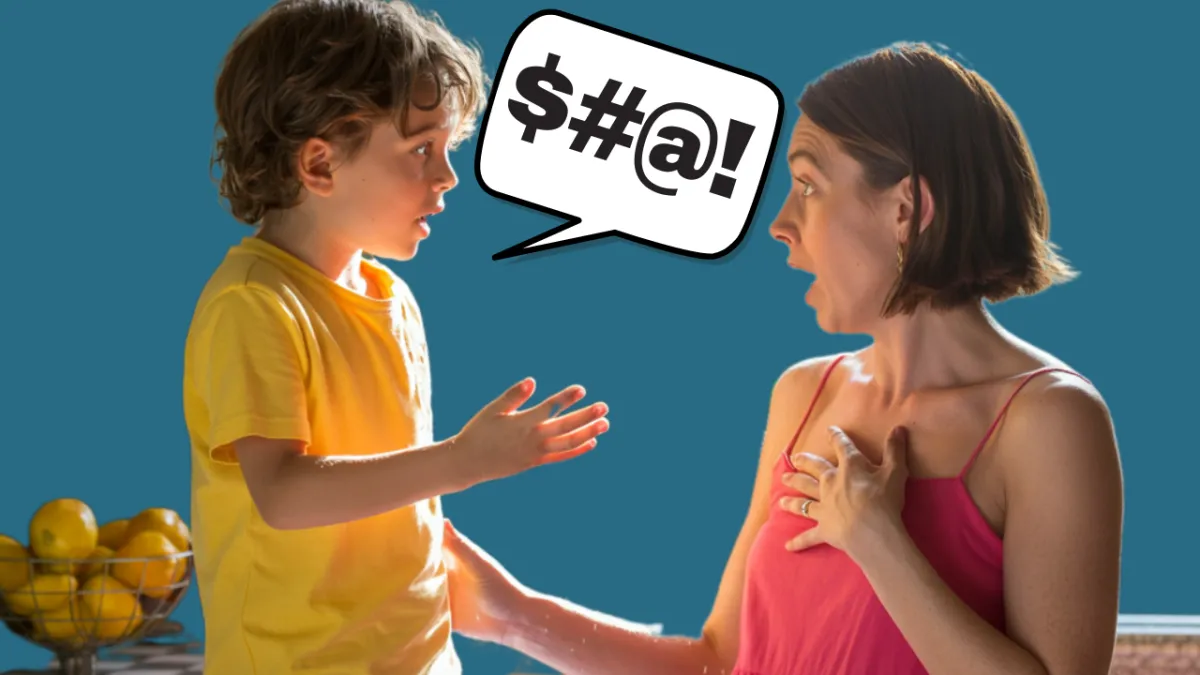
CHILD SWEARING: How to Respond


Have you ever overheard your child hanging out with their friends and been completely shocked by the words coming out of their mouth? One moment you’re making dinner, the next you’re wondering where your sweet little angel went—and whether swear words are about to become their new normal.
You’re not alone.
Nearly every parent hits this moment at some point and is left wondering how to respond. Today, I’m going to walk you through exactly how to handle swearing in kids and teens using my 5 C’s parenting framework—so the next time you hear a censored beep-worthy word come out of their mouth, you’ll feel confident in your response.
1. Communication: Set a Clear Family Protocol on Swearing
When it comes to swearing, the first thing to do is define what your family’s expectations are. Every household is different—some allow swearing in private conversations, others draw a hard line at any curse words at all.
The important part isn’t where you land on the spectrum. The important part is that your child knows exactly where your family stands.
Why it matters:
Swearing can make someone come across as more aggressive or less thoughtful.
It can unintentionally offend others.
Frequent swearing can become a reflexive habit—used without emotional awareness.
Relying on strong language may rob your child of chances to build emotional intelligence (learning to name and manage feelings more clearly).
Whether your line is “no swearing ever” or “just not in front of Grandma,” what matters most is that your expectations are clearly communicated.
2. Consistency: Hold the Line Without Harshness
Once you've defined your family’s swearing protocol, the next step is to stick to it consistently—without making your child feel shamed or judged as a person.
This is where unconditional positive regard comes in.
Unconditional positive regard means showing your child that their worth and value are constant, even when you’re correcting their behavior.
In the big picture, swearing is probably not the biggest parenting battle you’ll face. I recently coached a mom who used to wash her kids’ mouths out with soap whenever they swore. Over time, she realized that wasn’t the battle she needed to fight—and that her kids grew into thoughtful, respectful humans without that kind of extreme consequence.
So unless swearing is a core value issue in your home, aim to offer gentle correction, not harsh punishment. Swearing is behavior—not identity—and your child needs to feel safe even when they mess up.
3. Choices & Checkpoints: Understand Why It’s Happening
Let’s shift into a developmental perspective.
Kids (especially teens) often experiment with swearing during the identity formation stage of development. Erik Erikson called this the Identity vs. Role Confusion stage, and it’s all about teens trying to figure out who they are—separate from their parents.
Swearing might feel like:
A way to bond with peers
A symbol of independence or maturity
A test of boundaries
It’s similar to how teens may act differently at home versus with their friends. They’re trying on new roles—and sometimes that includes language choices you’re not thrilled about.
If you keep this developmental lens in mind, it can help you feel more patient and less reactive when the occasional curse word slips out.
4. Consequences: Gently Reinforce the Boundaries
As much as we want to lead with connection and understanding, it’s still essential to reinforce family rules—especially when it comes to language that might be offensive or disrespectful in certain settings.
Some gentle, effective approaches include:
A calm prompt like “Try that again with appropriate language.”
A quick redirect like “Let’s use words that reflect who you are.”
If necessary, a temporary removal from the situation (“Let’s take a break and come back when we can speak respectfully.”)
Swearing isn’t always about rebellion—it’s often about testing limits. When you uphold your family’s boundaries calmly and consistently, your child learns quickly what’s acceptable and what’s not.
5. Check Yourself: Reflect on What Matters Most
Let’s wrap up with a few quick reminders to help you stay grounded:
This does not mean you're a bad parent. Swearing is a very normal part of development for many kids.
Overly strict rules can backfire. When kids are never allowed to make mistakes, they may either internalize shame, rebel harder, or develop resentment.
So take a breath.
Choose your “party line” on swearing—clearly and confidently—and then stick to it without over-personalizing it. Your child is learning. And so are you.
Final Thoughts: You’ve Got This
Handling swearing in kids and teens doesn’t have to be a meltdown moment. When you use the 5 C’s—Communication, Consistency, Choices & Checkpoints, Consequences, and Check Yourself—you create a safe, respectful space where your child can grow and mature while still knowing what the boundaries are.
Want more strategies like these?
Join my newsletter for weekly tips, resources, and answers to real-life parenting challenges. You're not alone—and you're doing better than you think.
Learn more about my Better Behavior Blueprint program at drlindsayemmerson.com/workshop
